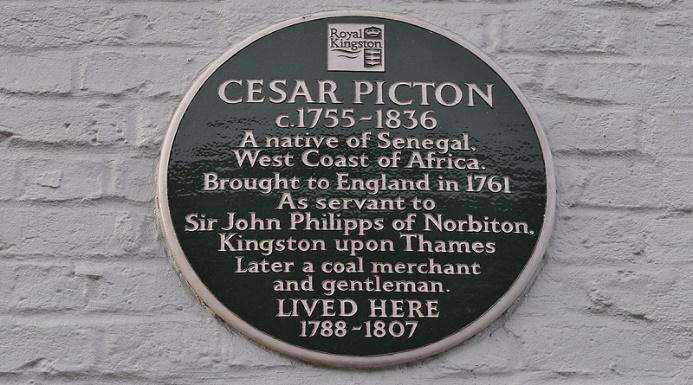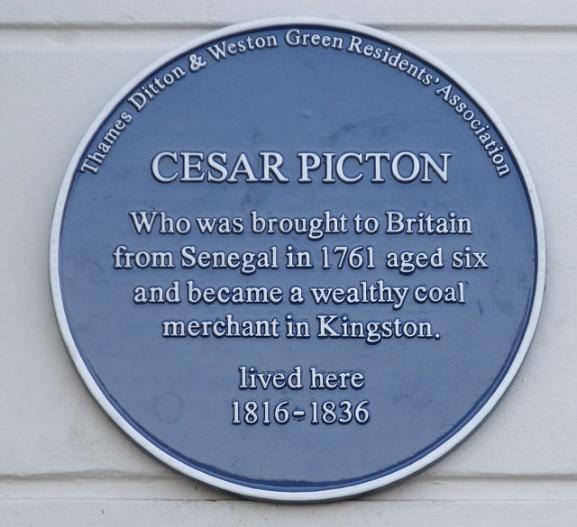Sir John Phillips of Kingston had him baptised and gave him the Christian name Cesar. His Senegalese name was never recorded. Picton took his surname from Picton Castle, Pembrokeshire, the Philipps’s country estate in Wales.
A successful businessman and coal merchant. Picton became rich despite initially being kidnapped for slavery.
He was bought and then taken to England by an English army officer who had been in Senegal. In 1761 he was presented as a servant to Sir John Philipps, who lived at Norbiton Place, near Kingston-upon-Thames in Surrey. Picton later became a wealthy coalmerchant in Kingston.
1755
1836
He died in 1836 at the age of 81 and is buried in All Saints Church, Kingston-upon-Thames. He was evidently a very large man as a fourwheeled trolley was needed for the coffin and ten coffin bearers. His funeral was modest, with no more than eight mourners.
Senegal, West Africa
1761 – brought to England by an English army officer who had been in Senegal, and presented as a servant to Sir John Philipps, who lived at Norbiton Place, near Kingston-upon-Thames in Surrey.
Sengalese
1761 – Cesar was six years old when he was taken as a slave from Senegal
1764 – Sir Philipps dies
1788 – Lady Philipps dies and leaves him £100 (about £16,064.99 in 2022) which he uses to set up in business as a coal merchant.
1795 – he buys his first properties including a wharf onto the Thames for unloading coal, and a malthouse.
1801 – Picton was convicted for poaching with an unlicensed gun and fined five pounds.
1807 – Picton let his Kingston properties and moved to a rented house in Tolworth and by then he was described as a gentleman.
1816 – he bought a house with a large garden in Thames Ditton for £4,000 (around £415,473.99 in 2022).
Sir John Philipps was a British Baronet and Member of Parliament. His journal for November 1761 recorded the arrival of Picton in his household, along with the gift of `a parakeet and a foreign duck’. He was soon baptised by the Philipps’, who were supporters of missionary work , although it is quite likely that he had been born into an Islamic family. Initially rigged out as an exotic pageboy, with a velvet turban (cost 10 shillings and sixpence) in the rococo fashion of the day, he became a favourite of the family, especially Lady Philipps.
Following the deaths of Sir John in 1764, and his wife in 1788, and the sale of Norbiton Place by their son, Picton used a legacy of £100 from Lady Phillipps to set up in business as a coal merchant in nearby Kingston. The move from servant to tradesman was a common one. Picton was presumably wellknown to the owners and upper servants of the many large houses in the area after nearly thirty years at Norbiton. The three unmarried Phillipps daughters had moved to nearby Hampton Court on the sale of the house, and since they all later left him legacies (in total by 1820, £250 and £30 a year), they may well have encouraged their friends to buy coal from him. In addition, it is probably no coincidence that the Phillipps’ estate at Picton was a centre of coal mining; he may well have sourced his supplies from them to mutual advantage, and perhaps had already been involved in managing their affairs.
His original premises at 52 High Street, Kingston-upon-Thames backs onto the River Thames. Picton lived here for the first years of his business, initially renting, but in 1795 buying it and other property including a wharf onto the Thames for unloading the coal, and a malthouse.
In 1807 Picton let his Kingston properties and moved to a rented house in Tolworth, perhaps marking his retirement aged 52 from active trade. He was by then described in deeds as a gentleman and by 1816 he bought a house with a large garden in Thames Ditton for an aboveaverage £4,000.
When Picton was about 33, Horace Walpole wrote in a letter of 1788: “I was in Kingston with the sisters of Lord Milford [Sir John’s son]; they have a favourite Black, who has been with them a great many years and is remarkably sensible”.
At this period `sensible’ meant `possessing sensibility’ ie being sensitive, able to respond to complex emotions. He had clearly achieved an unusual status in the household. Picton took his surname from Picton Castle, Pembrokeshire, the Philipps’s country estate in Wales, which was then a significant site for mining coal.
In 1801 Picton was convicted for poaching with an unlicensed gun and fined five pounds. The fine was relatively trivial for Picton and someone of lower social status may have faced execution or transportation to Australia for the same offence. Picton appealed the decision using the services of a London attorney, who challenged the conviction on the grounds that the magistrate’s record of the year of the offence was incorrectly recorded. The King’s Bench held that this was not material to the validity of the case, so the conviction was upheld. Picton’s race was not mentioned in either the judgement or the report of the appeal that appeared in The Morning Post.
There is no record of marriage, and he left his worldly goods to friends. He died a ‘respected man’ and a ‘gentleman’.
Links to wider Resources:
The Cesar Picton Story – YouTube
Credits (where info sourced from)
Cesar Picton (exploringsurreyspast.org.uk)




